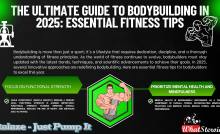Does Electrical Muscle Stimulation Work? What the Science Actually Says
Electrical Muscle Stimulation isn’t A Silly Pseudoscience
If you are eager to know if Electrical Muscle Stimulation, abbreviated as EMS, can help you gain muscle and recover you from workouts rapidly, then this article is tailored for you. What if shocking your muscles a little bit may help them grow and develop faster? What if you could be able to reduce muscle damage after working out? Also, what if EMS could make you stronger straight up? Well, this is why many people purchase and use EMS machines. Those people believe that electrical stimulation machines are a safe and easy way to gain strength and muscle faster. Also, people believe that EMS machines will boost their post-workout recovery.
You might believe in these things, too, but you are probably skeptical about the whole idea of the so-called electrical muscle stimulation. On one hand, the whole EMS approach sounds truly scientific, and the fact is that many professional athletes have been seen hooked on the EMS machines. Then again, certain athletes and professional bodybuilders will beat the drum for whatever brings a paycheck. Electrical stimulation machines are expensive, too, so they should offer some result to justify their cost.
Now, let’s delve deep and have a hard look at the science of EMS.
Not As Great As EMS Manufacturers Claim
As the first subtitle of this article says, EMS isn’t pseudoscience, but it is, however, not as great as the electrical muscle stimulation machine manufacturers claim.
EMS is safe, but, in reality, these machines won’t dramatically impact muscle recovery and growth. That being said, you shouldn’t necessarily give EMS a shot. However, you should have the right expectations. And that is what we are about to down in this article - explore EMS to the bone.


Electrical Muscle Stimulation In A Nutshell
Electrical muscle stimulation or EMS is exactly what it sounds to you: the usage of electrical currents for the purpose of stimulating your muscles. EMS is possible because our muscles naturally contract themselves in response to certain electrical signals sent by our brain. EMS machines exactly replicate such impulses and the muscle in the body to contract on command.
Does EMS Work?
Now, this is when the things will get a little bit gray. EMS rose to fame in 1976 when a scientist from the Soviet Union called Yohan Kots unveiled research that showed EMS may be able to boost one’s strength by up to 40%.
This finding of Kots’ perked a lot of ears. Since Yohan’s findings, many studies have been done on the topic of electrical muscle stimulation. Now, let’s briefly look at what we have learned about EMS.
Does Electrical Muscle Stimulation Increase Muscle Growth?
For example, weightlifting involves muscle contractions over and over, and muscles respond to that by growing stronger and bigger. Just like weightlifting, EMS contracts our muscles over and over.
Taking that into consideration, you may conclude that EMS can stimulate muscle growth too. However, in reality, electrical muscle stimulation won’t stimulate muscle growth. No study on EMS to this date has found out that EMS can boost muscle growth. This isn’t a surprise when we consider the physiology of muscle growth. With EMS, there is no external load, and there is no motion, both of which are key factors of muscle growth.
The bottom line is that electrical muscle stimulation is a weak stimulant for muscle growth and it shouldn’t be considered as a muscle builder.
Does EMS Improve Muscle Recovery?
There are pieces of evidence that light exercise, such as walking, is better than resting completely for recovering from a workout. This is known in science as active recovery.
Electrical muscle stimulation can accomplish the same thing by using gentle and short electrical pulses that mimic leisurely exercise. However, this theory has been disproven. Scientific studies have shown that EMS doesn’t reduce muscle soreness or improve muscle recovery. This is likely due to the fact that electrical muscle stimulation doesn’t increase the blood flow in the way active recovery does.
The Bottom Line
Electrical muscle stimulation isn’t what people are telling you it is. EMS won’t significantly improve your recovery or performance. However, EMS is also not a scam, either.
If EMS is combined with weightlifting, it can slightly improve your strength. However, EMS won’t help you gain that desired muscle mass faster.
Recent Posts
Creatine vs Myostatin: An Expert’s Analysis
Myostatin, a protein encoded by the MSTN gene, acts as a regulator of muscle growth.…
Raloxifene (Evista) 101: A Non-Surgical Solution for Gyno
Raloxifene, a selective estrogen receptor modulator (SERM), is one of the most valuable yet less…
Mastering Bodybuilding in 2025: Top Fitness Tips for Success
Bodybuilding is more than just a sport; it's a lifestyle that requires dedication, discipline, and…
Why Post-Cycle Therapy (PCT) Fails After a Nandrolone Cycle
Nandrolone, or Deca Durabolin, is an injectable anabolic steroid often used by bodybuilders during the…
Counteracting Anabolic Resistance with Adaptogens in Aging Men
As people age, maintaining muscle mass and strength becomes increasingly challenging due to a natural…
Tips on How to Store Peptides and HGH
When peptides are mixed with bacteriostatic water (BAC water), their longevity is highly influenced by…



